You are here
Concept Maps for Selected Australian Political Blogs, Part II
(Crossposted from Gatewatching.)
In this second part, we'll follow on from our discussion of key themes in The Other Cheek, Larvatus Prodeo, and Club Troppo by looking at the concept maps which Leximancer produces. But first, a recap of the background for this study: I've already posted about our work in developing a new methodology for mapping link and concept networks in the Australian blogosphere. For a first test run of this project, we archived posts in some 300-400 Australian political blogs between the start of November 2007 (the last month of the federal election campaign) and the end of January 2008. We distinguish between different functional components of blogs and blog pages, and what I'm focussing on here are the blog posts themselves, which are of course the major discursive element of any blog - as part of our approach, we've separated these posts from all other content on the blog (headers, footers, blogrolls, sidebars, comments sections, etc.).
What I've done here in the first place is to run the concept mapping software Leximancer over the content gathered from a selection of key Australian blogs. In the first part of this post, I simply listed the key terms for each blog in order of frequency (giving a quick indication of what they're frequently talking about), which produced some notable differences between the three blogs. My reading of this is that Club Troppo focusses much more strongly on policy analysis over political wonkery and insider gossip; for The Other Cheek, the balance is reversed, while Larvatus Prodeo sits somewhere in the middle.
In this second part, I'll map these blogs' key terms in relation to one another - terms which frequently co-occur in close proximity to one another in the text are located closer to one another on the map than terms which don't, in other words. The resulting maps provide further support to the observation that the blogs have different points of focus in their day-to-day coverage of politics - and by plotting all frequently-used terms on the map, the exact nature of these topical clusters becomes a little clearer, too.
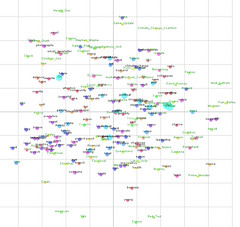 Starting again with The Other Cheek, then: to begin with, here's a map of all key terms in relation to one another: frequently co-occurring terms are located close to one another on the map, and the size of the circle for each term indicates its overal frequency (so, for OC, the terms 'Labor' and 'Liberal' have the largest circles as they occurred most frequently). Ignore the colour of the circles for the moment - and click on the image for a full-size version.
Starting again with The Other Cheek, then: to begin with, here's a map of all key terms in relation to one another: frequently co-occurring terms are located close to one another on the map, and the size of the circle for each term indicates its overal frequency (so, for OC, the terms 'Labor' and 'Liberal' have the largest circles as they occurred most frequently). Ignore the colour of the circles for the moment - and click on the image for a full-size version.
There's a few interesting clusters here - most closely connected is probably the one in the bottom left quadrant, which contains terms such as 'bizarre', 'corrupt, 'courageous', 'friends', 'power', 'serious', 'failed', 'claims', etc. Looks to me like this is OC at its most gossipy. A broader, looser cluster exists in the bottom centre - terms such as 'love', 'leftard', 'electorate', 'government', 'office', 'policy', 'media', etc. can be found here. I'd read this as general politics. Above and to the right of this is a more close-knit cluster of terms around 'election', 'minister', 'campaign', 'excellent', 'supporters', 'successful', and 'leader', and overall top terms 'Labor' and 'Liberal' are also found here (as is OC darling Sophie Mirabella) - clearly this cluster is related directly to the election and its immediate aftermath.
Further above this are a few smaller clusters of terms: 'Radio National', 'climate change', 'Philip Adams', 'Greens', 'ABC', 'radio', and the more distant outlier 'Climate Change Coalition' indicate Landeryou's continuing line of commentary not so much on the science of climate change itself, but on reporting (especially by the ABC) on climate change issues; to the left of this, a small cluster around 'Stephen Mayne', 'Nameless' (a.k.a. Crikey, founded by Mayne), 'Higgins' (the federal seat for which Mayne stood as an independent), 'candidate', 'OC Investigations Unit', and 'wrong' indicates Landeryou's interest in (and opinion on?) Mayne's political activism. 'Christian' and 'Family First' also appear in this cluster.
Finally, also interesting are the overall outliers on this map - especially on the right edge of the map, David Feeney, Mark Latham, Fran Bailey, the seat of McEwen, Abbott, Turnbull, Nelson, Parliament, Canberra, Victorian Premier Brumby, the term 'Prime Minister', all make an appearance, but without being closely connected to any one cluster of themes. (Rudd and Howard also appear in this way, though - as we might expect - somewhat more closely linked to the election cluster.)
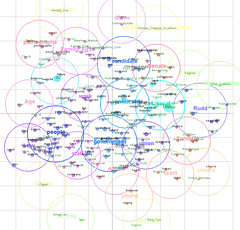 Leximancer also has the ability to highlight such clusters automatically, but that functionality isn't particularly well-developed so far (which is why I've focussed on discussing the plain map so far). In particular, it labels its clusters simply with the most frequent term contained within them, which can be misleading at a casual glance. Nonetheless, it points to pretty much the same conclusions: the 'gossip' cluster is here labelled 'people'; the 'general politics' one 'government'; the 'election' one 'Labor' (hard to read in turquoise); the 'climate change' one is split into 'candidate' and 'Senate' (an artefact of my settings for the maximum/minimum size of clusters), and the 'Stephen Mayne' cluster is labelled 'Family First' here (because the terms 'Christian' and 'Family First' also appear here).
Leximancer also has the ability to highlight such clusters automatically, but that functionality isn't particularly well-developed so far (which is why I've focussed on discussing the plain map so far). In particular, it labels its clusters simply with the most frequent term contained within them, which can be misleading at a casual glance. Nonetheless, it points to pretty much the same conclusions: the 'gossip' cluster is here labelled 'people'; the 'general politics' one 'government'; the 'election' one 'Labor' (hard to read in turquoise); the 'climate change' one is split into 'candidate' and 'Senate' (an artefact of my settings for the maximum/minimum size of clusters), and the 'Stephen Mayne' cluster is labelled 'Family First' here (because the terms 'Christian' and 'Family First' also appear here).
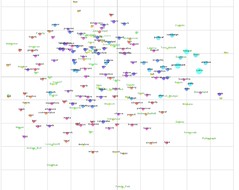 OK, on to Larvatus Prodeo, then: again, the concept map for this blog appears to bear out my description of thematic coverage in this blog as somewhere between political wonkery and policy analysis. That said, there isn't such a great deal of clear clustering in this case - especially in the bottom half of the map, concepts are spread relatively evenly, which indicates perhaps something of a general purpose nature in LP's coverage. Smattered across this bottom half are terms like 'uranium', 'energy', 'Wentworth', 'commentators', 'climate', 'education', 'indigenous', 'Andrw Bartlett', 'schools', 'Kyoto', 'Crikey', and 'Poll Bludger', but without any clear sence of strong connection through co-occurrence.
OK, on to Larvatus Prodeo, then: again, the concept map for this blog appears to bear out my description of thematic coverage in this blog as somewhere between political wonkery and policy analysis. That said, there isn't such a great deal of clear clustering in this case - especially in the bottom half of the map, concepts are spread relatively evenly, which indicates perhaps something of a general purpose nature in LP's coverage. Smattered across this bottom half are terms like 'uranium', 'energy', 'Wentworth', 'commentators', 'climate', 'education', 'indigenous', 'Andrw Bartlett', 'schools', 'Kyoto', 'Crikey', and 'Poll Bludger', but without any clear sence of strong connection through co-occurrence.
To the left of this (top centre and further left) is a cluster of related terms which indicate the further analysis of political positions (beyond a mere coverage of the electoral and post-electoral race): 'security', 'spending', 'democracy', 'speech', 'rates', 'infrastructure', 'left', 'wrong', 'promise', 'work', 'Workchoices' all point in this direction, as does the presence of some key figures (Barnaby Joyce, Kevin Andrews, and Julia Gillard) and organisations (ASIO). Additionally, LP's local base in Brisbane is indicated by the presence of 'Queenslanders' as a term in this cluster. 'YouTube' may be indicative of the site's continuing coverage of the use of new media tools in electioneering, but could also simply point to the common practice of embedding relevant YouTube clips in the blog.
Just left of this appears a further, relatively tight-knit cluster of terms like 'information', 'entertainment', 'society', 'evidence', 'human', 'average', 'ends', and 'cuts', but just what these terms have in common is unclear to me. Further digging into the data should be able to reveal this, though...
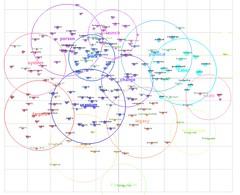 Looking at Leximancer's thematic clusters isn't much more help on this score either, by the way - given the even spread of terms across the map, it's clearly struggling to come up with sensible clusters. Still, the two clusters named 'political' and 'Labor' here roughly correspond to the 'electoral race' cluster I've described'; Leximancer's 'work' cluster (with some of 'launch' added) makes for a good approximation of what I would see as a political analysis cluster, and 'person' is as good as any for the mystery cluster to the left of it... We shouldn't put too much stock into the 'uranium' cluster, or any others in the bottom half, though - they're clearly too diverse and too dispersed to be properly described as 'real' clusters.
Looking at Leximancer's thematic clusters isn't much more help on this score either, by the way - given the even spread of terms across the map, it's clearly struggling to come up with sensible clusters. Still, the two clusters named 'political' and 'Labor' here roughly correspond to the 'electoral race' cluster I've described'; Leximancer's 'work' cluster (with some of 'launch' added) makes for a good approximation of what I would see as a political analysis cluster, and 'person' is as good as any for the mystery cluster to the left of it... We shouldn't put too much stock into the 'uranium' cluster, or any others in the bottom half, though - they're clearly too diverse and too dispersed to be properly described as 'real' clusters.
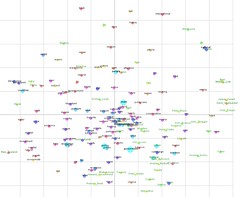 Finally, then, let's look at Club Troppo, where the picture is much more conclusive. Here, right in the centre of the map there is a very clear, strong cluster containing terms such as 'culture', 'school', 'child', 'social', 'community', 'funding', 'family', 'measures', 'program', 'welfare', 'local', 'performance', 'attempt', 'support', 'Aboriginal', and a fair few more. Also present are a number of key actors - Mal Brough (the architect of the Howard government's intervention in indigenous communities, of course), Kevin Andrews (a former employment and workplace relations minister, and at the time of our analysis a key figure in the Mohamed Haneef affair), and former PMs Keating and Hawke. I think it's clear that this cluster points very directly to a strong and continuing focus especially on social policy by Club Troppo.
Finally, then, let's look at Club Troppo, where the picture is much more conclusive. Here, right in the centre of the map there is a very clear, strong cluster containing terms such as 'culture', 'school', 'child', 'social', 'community', 'funding', 'family', 'measures', 'program', 'welfare', 'local', 'performance', 'attempt', 'support', 'Aboriginal', and a fair few more. Also present are a number of key actors - Mal Brough (the architect of the Howard government's intervention in indigenous communities, of course), Kevin Andrews (a former employment and workplace relations minister, and at the time of our analysis a key figure in the Mohamed Haneef affair), and former PMs Keating and Hawke. I think it's clear that this cluster points very directly to a strong and continuing focus especially on social policy by Club Troppo.
In the bottom right, finally, is a looser smattering of terms which seem related to the coverage of the electoral race: 'Labor', 'Liberals', 'leader', 'Howard', 'Coalition', 'campaign', 'election', and also 'Senate' and 'Andrew Bartlett'; additionally, LP founder Mark Bahnisch also makes an appearance here, most likely as a result of Troppo's repeated linking to Mark's posts about the electoral and post-electoral race in Larvatus Prodeo and elsewhere. It appears evident, though, that campaign and post-campaign politicking isn't anywhere near the core of Troppo's interests, and that its focus instead lies with the policies themselves.
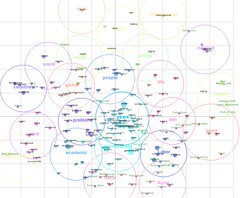 For once, Leximancer's own concept clusters work pretty well here, too: while the central policy cluster is here misleadingly named 'years' (because that term was the most frequently used of the ones included in the cluster), its overall dimensions are about right. Similarly, the 'fiscal' cluster at the bottom encompasses pretty much the same terms I've listed above in relation to Howard's economic policies. To the right of this, the 'Labor' and 'Rudd' clusters combine to indicate the extent of Troppo's electoral coverage, while in the top left, 'countries', 'world', and 'global' cover international issues. Below this, 'price' and 'New Zealand' incorporate themes related to broader economic issues.
For once, Leximancer's own concept clusters work pretty well here, too: while the central policy cluster is here misleadingly named 'years' (because that term was the most frequently used of the ones included in the cluster), its overall dimensions are about right. Similarly, the 'fiscal' cluster at the bottom encompasses pretty much the same terms I've listed above in relation to Howard's economic policies. To the right of this, the 'Labor' and 'Rudd' clusters combine to indicate the extent of Troppo's electoral coverage, while in the top left, 'countries', 'world', and 'global' cover international issues. Below this, 'price' and 'New Zealand' incorporate themes related to broader economic issues.
What's it all mean? Well, in the first place, and most importantly for our further research, this first exploration of our data indicates the validity of our research approach. In both the frequency data described in the first part of this post, and the maps presented here, some clear differences between the three blogs become evident - as anyone familiar with these blogs, and the thematic and stylistic differences between them, would expect.
What this enables us to do is to come to grips, on a quantitative basis, with Australian political blogs - we can measure and distinguish their thematic direction overall, and identify how this might change over time as the political cycle proceeds. It helps us get away from the otherwise almost inevitable shortcut descriptions of specific blogs as 'left', 'centre', and 'right'; in the analysis presented here, for example, a clear distinction between the political wonkery and gossip of OC and the policy analysis of Troppo has emerged, with LP perhaps sitting somewhere in the middle (and just to be clear, neither of these descriptions imply value judgments - a mature political blogosphere probably needs all of this, and more).
As we move on from here to consider link networks in the Australian political blogosphere, our next step is to repeat this concept analysis for the clusters of highly interlinked blogs that we find. My inkling is that blogs which link frequently to one another may well display a compatible thematic focus (gossip blogs link to gossip blogs, policy blogs link to policy blogs, etc.), but I may well be wrong - perhaps the presence, for example, of Mark Bahnisch's name as a commonly used term in Troppo indicates that blogs specialising in one approach (say, policy analysis), link frequently to blogs which operate in a different, but complementary field (say, electoral coverage)? Additionally to all this, of course, we'll also go back to the data for a closer, qualitative look at some of the thematic clusters we've already identified. What exactly is covered, for example, by the 'fiscal' or 'global politics' clusters on Troppo; what is the relationship between Stephen Mayne and Family First on The Other Cheek?
More on all this at a later stage. First, as a further addendum to these two posts, I'm hoping to compare the thematic coverage of Tim Dunlop's two blogs, the group-authored Road to Surfdom and his News.com.au site Blogocracy. Sometime next week, hopefully.
And finally: as always, my sincere thanks and deep gratitude to our colleagues Lars Kirchhoff and Thomas Nicolai for their stellar work in gathering and processing the data on which this analysis is based!
- Snurb's blog
- Add new comment
- 8920 reads
 Printer-friendly version
Printer-friendly version

![Creative Commons Attribution-NonCommercial-ShareAlike 2.0 License [Creative Commons Attribution-NonCommercial-ShareAlike 2.0 License]](http://creativecommons.org/images/public/somerights20.gif)




